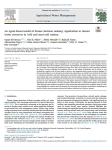El Fartassi I., Milne A.E., Metcalfe H., El Alami R., Diarra A., Alonso-Chavez V., Zawadzka J., Waine T.W., Corstanje R. (2025). An agent-based model of farmer decision making: application to shared water resources in arid and semi-arid regions. Agricultural Water Management, 01/04/2025, vol. 310, p. 109357.
https://doi.org/10.1016/j.agwat.2025.109357
https://doi.org/10.1016/j.agwat.2025.109357
| Titre : | An agent-based model of farmer decision making: application to shared water resources in arid and semi-arid regions (2025) |
| Auteurs : | I. El Fartassi ; A.E. Milne ; H. Metcalfe ; R. El Alami ; A. Diarra ; V. Alonso-Chavez ; J. Zawadzka ; T.W. Waine ; R. Corstanje |
| Type de document : | Article |
| Dans : | Agricultural Water Management (vol. 310, April 2025) |
| Article en page(s) : | p. 109357 |
| Langues : | Anglais |
| Langues du résumé : | Anglais |
| Catégories : |
Catégories principales 07 - ENVIRONNEMENT ; 7.3 - Eau. Gestion de l'EauThésaurus IAMM RESSOURCE EN EAU ; GESTION DES EAUX ; MODELE ; AIDE A LA DECISION ; PRISE DE DECISION ; AGRICULTEUR ; ZONE ARIDE ; MAROC |
| Mots-clés: | MODELE MULTI-AGENTS |
| Résumé : | The study presents an agent-based modelling framework that integrates behavioural and biophysical models to investigate shared irrigation water management in an arid region. The behavioural model simulates farmers' decisions about their water irrigation sources (dam or groundwater) and whether to continue cultivating in the face of drought. This model was parameterised using survey data. The biophysical model component quantifies the impact of water availability and irrigation sources on soil salinity accumulation and its effects on crop productivity. Applied to the Al Haouz Basin, in Morocco, the integrated model reveals several key findings: (1) Increased groundwater access through water abstraction authorization can initially boost productivity but leads to widespread salinisation and farm abandonment, particularly under climate change scenarios. (2) Scenarios with reduced dam water availability demonstrate that mixed irrigation strategies mitigate short-term productivity losses but fail to prevent long-term soil salinity issues. (3) Land abandonment is significantly influenced by the level of water abstraction authorizations, with higher abstraction leading to more severe environmental degradation and social impacts. (4) Policy scenarios reveal that there is a theoretical optimal level of groundwater abstraction that maximises productivity while minimising land abandonment and salinity build-up. These results highlight the complex trade-offs between short-term gains and long-term sustainability, emphasising the need for holistic water governance policies that balance individual and collective interests. |
| Cote : | En ligne |
| URL / DOI : | https://doi.org/10.1016/j.agwat.2025.109357 |







